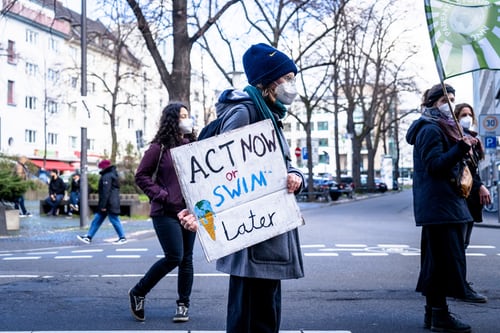Vaccinations are progressing and it seems that the dominance in the fight against the pandemic is approaching. But the fight in two different, but interconnected, frontlines is still ongoing. The first concerns the increase of inequalities and insecurity exacerbated by the pandemic. The second concerns the rescue of the planet from environmental and climatic collapse.
As for the first, in Biden’s America, today speaking, the 400 richest Americans have a wealth approaching 3.2 trillion. £., while 30 years ago it was approaching 288 billion £. The minimum tipped wage then (in 1991) was £ 2.13 per hour. And remains unchanged until today. In Europe, inequalities are high, with a percentage of 40% of the population owning only 3% of wealth and one-fifth of Europeans at risk of falling below the poverty line due to the pandemic.
The current development model also creates intergenerational inequalities, with the transfer of future resources for consumption now. And the bill goes to the young people. This creates a critical financial debt to the next generation, already from the beginning of their lives.
An new debt is added to that, the ecological one, from the second fight, that of the destruction of the planet. The use of the term “ecological debt” was first introduced by the report of the Global Footprint Network, through the Earth Overshoot Day.
In practice, on this date, which is estimated each year, the Earth exhausts its ability to absorb the ecological footprint of human activity. From this date on we live “on credit”. Since the 1970s, when Earth Overshoot Day was adopted, we exhaust this capacity of the Earth earlier every year. The only exception was in 2020, when due to the pandemic we had the largest postponement of this date on an annual basis (on August 22).
This year, humanity will run out of natural resources that the Earth can renew on July 29. This means that we are using the resources of 1.7 Earths. Think about that. Already between 1 January 2021 and 29 July 2021, our demand for biological regeneration is analogous to the planet’s entire annual regeneration. For the United States of America, this day has already passed, on March 14, 2021. America needs 5 planets on an annual basis. In Europe, France and Germany need 2.9 planets. In total, since the ’70s, when the measurements were made, we have already “borrowed” from our children the natural resources of almost thirteen planets.
The main drivers for this year’s Earth Overshoot Day were:
- Carbon footprint: A growth of 6.6% from 2020;
- Global forest biocapacity: A depletion of 0.5% from 2020, due in large part to the spike in Amazon deforestation. Only in Brazil,1.1 million hectares were lost in 2020.
Thus, a development problem becomes ecological and climatic, and a climatic one has also economic and social implications.
Ecological debt is now recognized in courts. On April 29, following an appeal by young Germans, the German Climate Law was declared partially unconstitutional. The reason for this is that the emission cuts are disproportionately shifted after 2030, dramatically restricting the basic rights of the younger generation. In addition, on May 26, a Dutch court forced Shell to reduce CO2 emissions by the end of 2030 by 45% (compared to 2019). The basic argument for this decision is that if Shell continues to invest billions in fossil fuels, that threatens the future of young people.
But it is not just a legal matter, seeking redress in the courts. It is not even a financial one, hoping to be resolved through a “haircut”.
Based on the PARIS REINFORCE project ( https://www.paris-reinforce.eu/) results, the global temperature is estimated to be above 1.5 °C of the Paris Agreement and most probably in between 2.2°C and 3.2oC. Moreover, based on the Oxford University Economic Recovery Project, only 10% of the $17tn in bailouts provided by governments since the start of the pandemic was spent on activities that reduced greenhouse gas emissions or restored the natural world. “Disastrous” energy policies of China, Russia, Brazil, and Australia could cause a 5 °C increase in temperatures, if adopted by the rest of the world (Guardian-The analysis, by the peer-reviewed group Paris Equity Check).
The problem is thus deeply political. And if the climate actions of the forthcoming period aren’t bold and urgent, the debt created will “drown” the planet and the future generations.



